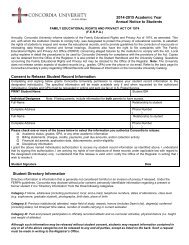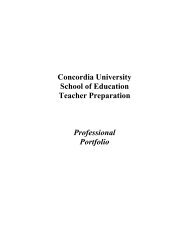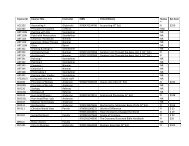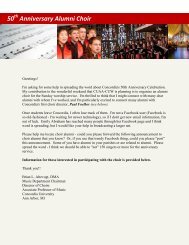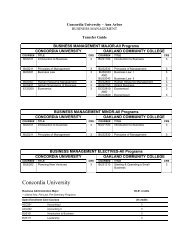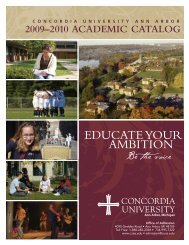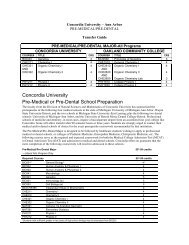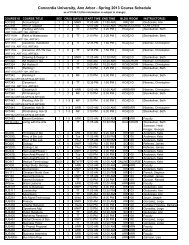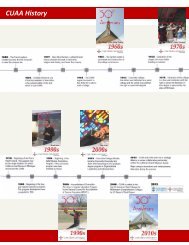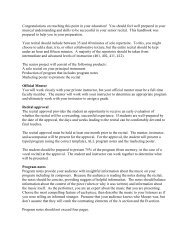2006â2007 Academic Catalog - Concordia University Ann Arbor
2006â2007 Academic Catalog - Concordia University Ann Arbor
2006â2007 Academic Catalog - Concordia University Ann Arbor
You also want an ePaper? Increase the reach of your titles
YUMPU automatically turns print PDFs into web optimized ePapers that Google loves.
34 |<br />
DEGREE REQUIREMENTS<br />
Proficiency Requirements*<br />
0-14 credits<br />
Foreign Language I & II 6<br />
Mathematics** 2<br />
Speech 3<br />
Writing 3<br />
*Student may complete proficiency requirements by exam or by course work. In some cases, proficiency<br />
can be established without earning college credit. See General Studies Proficiency Requirements (p. 38).<br />
**Any mathematics course must be more advanced than Intermediate Algebra and requires a grade of<br />
C- (1.6667) or better.<br />
General Studies Core<br />
29 credits<br />
GST151 Introduction to Campus Computing 2<br />
GST182 Freshman Seminar 1<br />
ATS281 Living with the Arts 3<br />
BIV131 Introduction to the Christian Religion 3<br />
Choose one of these<br />
BIV132 Sacred Scripture 3<br />
REL241 Biblical Literature I 3<br />
REL242 Biblical Literature II 3<br />
HER100-299 (various courses) 3<br />
INS100-299 (various courses) 3<br />
LAN282 Language, Communication, and Culture or a second year 3<br />
(third semester) foreign language course<br />
NAT281 (various titles) 3<br />
NAT282 Biology and the Whole Person 3<br />
Physical Activity Courses 2<br />
Electives<br />
17-31 credits<br />
Minimum Total required = 60 credits<br />
Note: At least 30 credits must be earned through courses offered by <strong>Concordia</strong> <strong>University</strong>, <strong>Ann</strong> <strong>Arbor</strong>.<br />
General Studies Curriculum Overview<br />
Based on the <strong>University</strong>’s mission of preparing men and women for a life of service in the<br />
church and in the world, the General Studies curriculum provides a set of experiences,<br />
knowledge, and skills necessary for a life of Christian service. The curriculum introduces<br />
the liberal arts through interdisciplinary study, with a focus on problem-solving. The student<br />
will confront ambiguity, complexity, and synthesize disciplinary insights into a comprehensive<br />
understanding of selected problems in the context of Christian faith and values.<br />
Outcome Domains<br />
Content Areas: Explore the interrelationships between disciplines, probe their assumptions,<br />
and understand their contexts and methods of analysis. The categories of Heritage,<br />
Institutions, and the Arts provide the content for problem identification. Problems are<br />
framed within the following contexts:<br />
• Exploring the Christian Faith<br />
• Functioning within Social Institutions



